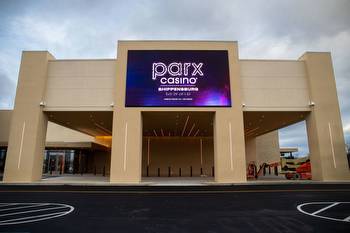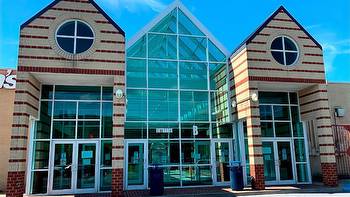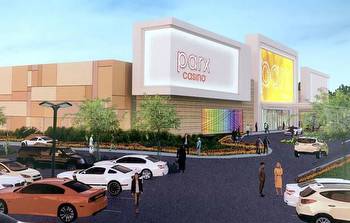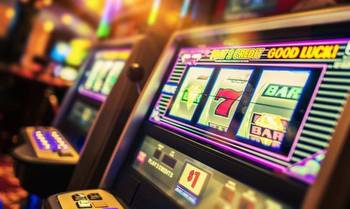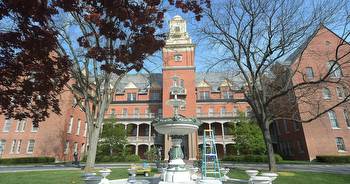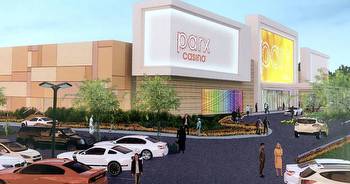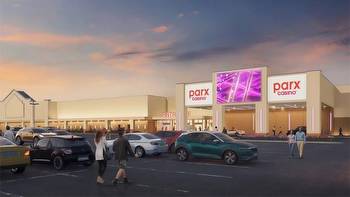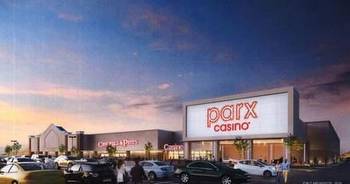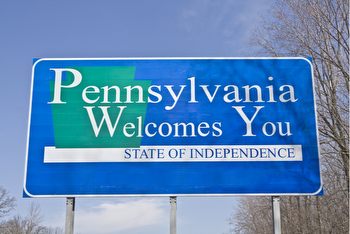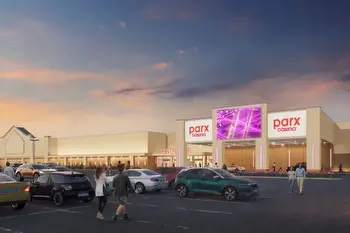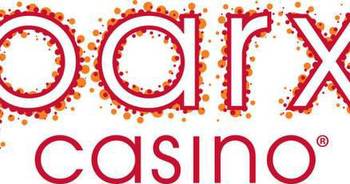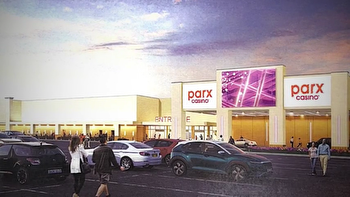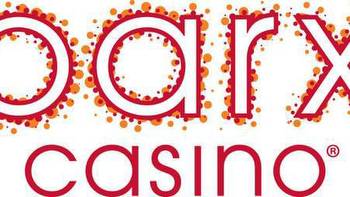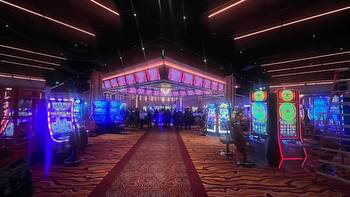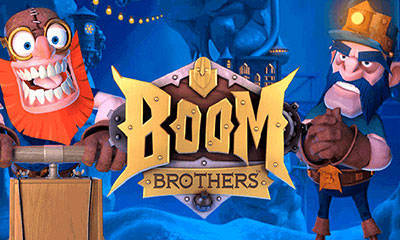Proposed Shippensburg casino sparks spirited debate

SHIPPENSBURG - Opponents had their say Thursday at a public hearing for a proposed 73,000-square-foot Parx casino and restaurant planned for the empty Lowe’s store in Shippensburg Township.
One by one, residents - mostly from neighboring municipalities - argued to Pennsylvania Gaming Control Board members that the proposed casino will, in the long run, prove to be a drain on the community through increased rates of gambling addiction, less disposable income for other businesses and a change in the character of what several referred to as “a Hallmark movie town.”
“All of the lights and the big-screen TVs mean nothing to us. That doesn’t help the suffering that comes when people lose their money so that you can get rich, when people have a hard time feeding their children, paying their rent, and dealing with the addictions that come with it,” said the Rev. Jim Rogers, pastor of the Shippensburg First Church of God.
“We don’t want you here,” Rogers concluded, as many of the roughly 100 residents in attendance burst into applause.
There were supporters present, too, including leaders of local township government and fire services who see the host payments due to Shippensburg Township - estimated by Parx at $741,000 annually - as a key to their future financial stability.
Mickey Nye, president of Shippensburg Area Development Corporation, said his group endorsed the project too, seeing the 75 full-time and 100 part-time jobs and the projected $41 million in annual spending by casino visitors outside the facility on hotel, food and other businesses as a great injection into the local economy.
Stuck somewhere in the middle were leaders of local social service agencies, who appealed for an additional set-aside of revenues - whether from the host payments or from Parx directly - for their entities to beef up the area’s capacity to deal with compulsive gambling issues and all of the problems that they believe will flow from them.
The inflamed passions have followed this Parx project south along the Interstate 81 corridor ever since the company first tried to interest Carlisle Borough Council members into rescinding their local ban on casinos in 2018, so that Parx could locate in the shell of an empty Bon Ton store at the struggling Carlisle Plaza Mall.
After getting strong pushback from residents, Carlisle said no, and Parx then looked to neighboring South Middleton Township, only to be rebuffed again.
The company - which paid $8.1 million for the rights to build one of the state’s so-called mini-casinos in Cumberland or Franklin Counties - eventually landed in Shippensburg Township, one of the relatively few municipalities in this area that left its doors open to casino development after the state legislature and Gov. Tom Wolf agreed on the concept in 2017 as part of a budget agreement.
They are intended as intentionally small casinos designed for second-tier markets that are seen as outside the primary markets of the state’s original 12 commercial casinos. But the 2017 law also opened the door, of course, for casino gambling to now be wedged into small-town markets - usually because of interstate highway access - where many, if not most, residents really don’t want it.
To date, the Pennsylvania Gaming Control has approved three of the four mini-casinos that have sought licenses under the 2017 law. The approvals include a new Hollywood Casino planned near Morgantown, Berks County, that also drew intense opposition from its future neighbors through 2019.
The only mini-casino to be rejected by the gaming control board to date was a project in Beaver County that, according to PGCB spokesman Doug Harbach, was voted down because of concerns about its financial viability.
In Shippensburg, Parx proposes to fill the old Lowe’s site at the Shippen Towne Center here with 500 slot machines and 48 electronic table games, as well as a nationally-branded restaurant / sports bar with seating for about 250. The company would also take sports bets at the site, said John Dixon, chief operating officer of Greenwood Gaming, the Parx brand’s corporate parent.
Projected hours are 9 a.m. through midnight Monday through Thursday, with the casino then operating around the clock from 9 a.m. Friday through midnight Sunday.
Tentative plans call for the casino to open sometime in 2022.
At its flagship site in suburban Philadelphia, Parx has been one of the state’s most successful casino operators by any barometer.
But opponents at Thursday’s mandated public hearing on the project said that’s precisely the point: Shippensburg isn’t Philadelphia, and they worried that a casino here will ultimately prey on the most vulnerable of their neighbors.
Resident Josh Rosetta, a Shippensburg Borough resident, pushed back against that notion Thursday. He argued that the casino jobs - which Parx has said would pay an average salary of more than $40,000, plus benefits - could be exactly what’s needed to help lift some of the 15 percent of Shippensburg residents whose household income falls below the federal poverty line.
“If you care about the poor people, you know, let’s try to get them jobs. There’s good-paying jobs here... I’m not going to say that every poor person can’t handle themselves, and all of a sudden they’re going to go gambling,” Rosetta said. “The fact is, we need an economic boost in this town.”
But the very next speaker, Anastasia Hummer, countered there are already plenty of jobs in the area, that aren’t accompanied by the greater risk of addiction.
“There are plenty of jobs out there right now,” Hummer said. I go around Shippensburg and... every single place I pass has hiring signs.”
At times, the spirited back-and-forth got personal.
“I will never buy a car from who spoke for this. If he’s all for this, I’m against buying cars from him,” said Alvin Martin, referring to the SADCO President Nye, who runs the local Chevrolet dealership. Martin said he grew up with a father who was a gambling addict.
Shippensburg Township Supervisor Linda Asper said the opponents are projecting the problems of places like Atlantic City onto safe, corporate operations that - the evidence shows - have caused little disruption in other rural areas like Grantville, where Penn operates the much larger Hollywood Casino at Penn National Race Course.
“You keep talking about all of the problems this is going to bring to our community,” Asper challenged the project’s critics, noting she already see’s local residents taking their paychecks to bingo games run by local fire companies. “It’s a mini-casino. It’s not Atlantic City. It’s not Vegas. OK? It’s a mini-casino.
“To get anywhere in life, you have to take gambles. I think this is a gamble the Shippensburg community should take.”
After the meeting, Parx’s Dixon said the opposition is not unusual for areas that have not had commercial gambling operations in their midst, but they aren’t show-stoppers for the company.
“I think at the moment we’re committed to the project,” Dixon said. “Obviously we’ve taken notes and we’ll read the testimony from everybody and, if there’s things there that we can do to try and make people feel more comfortable with us, we’ll obviously do that. We want to be a good citizen.”
Movement on the Shippensburg project has been held up for nearly two years, after Parx walked away from a different site right off Interstate 81′s Exit 29 interchange because of sinkhole issues and concerns about sharing an access road with tractor-trailers headed to the nearby distribution center.
After a renewed search, the company settled on the former Lowe’s building last year, but then got stuck in a dispute with the state Department of Transportation over the scope of a traffic impact study on the new site, which Parx was worried could leave it on the hook for major traffic improvements at the I-81 interchange even though they are now about one mile away.
Gaming industry analysts have said from the start that easy highway access would likely be a key feature in attracting interest from casino operators in the state’s new licenses for intentionally-small satellites.
That dispute was eased this winter, when Parx and the Gaming Control Board reached agreement on a revised traffic study plan taking in the larger geographic area, but guarantees the casino company will only be charged for recommended future road improvements according to the share of increased traffic its site accounts for.
From a land use perspective, the project meets all other requirements public utility service, parking, fire truck access and distance from protected classes of properties, like residential neighborhoods, churches or schools.
Harbach, the gaming control board spokesman, said the board will take the comments from Thursday’s meeting and additional written submissions - which also track overwhelmingly against the plan, but many of which were posted by Thursday’s attendees - and use them along with separate examinations of the project’s financial viability and Parx’s track record to reach a final decision on the grant of the license.
That decision, Harbach said, will most likely come later this year.









